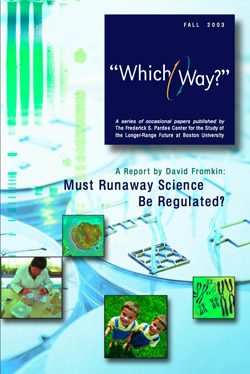Which Way Series
 Must Runaway Science be Regulated?
Must Runaway Science be Regulated?
Published Fall 2003 (5 pages)
Download PDF
Modern society takes a completely different view of curiosity than ancient society did. The Tower of Babel, the wings of Icarus, Pandora’s Box, and of course, Adam and Eve, all punish human beings for extending their search for knowledge to presumptuous heights. Today’s civilization thrives upon the freedom to do just that. Sometimes fear of what we might do with our knowledge and our power is reawakened, and ethical questions arise of how far we should go – for example, with cloning. Biogeneticists may be able to alter the genes of our unborn offspring, as discussed in the Pardee Center’s conference on “The Future of Human Nature.” The idea was proposed that a global bioethics authority might be desirable in order to control science. There are many potentially disastrous results that could come from genetic mutations – disease, terrorist threats, a new species of human beings… And what we will do with our scientific
capabilities is yet to be seen.
David Fromkin is a Professor of International Relations, History, and Law, and former Director of the Frederick S. Pardee Center. He has worked as an attorney and a private investor, has been a member of the Council on Foreign Relations since 1976, and was the head of foreign policy for Hubert Humphrey in his presidential campaign of 1972.